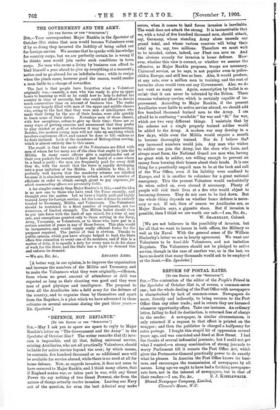"DEFENCE, NOT DEFIANCE."
[To THE EDITOR OP THE "SPECTATOR.1
SIR,—May I ask you to spare me space to reply to Major Rankin's letter on "The Government and the Army" in the Spectator of October 31st? The writer remarks that (1) inva- sion is impossible, and (2) that, failing universal service, existing Auxiliaries, who are all practically Volunteers, should be liable for active dervice beyond the seas ; by which means, he contends, five hundred thousand or so additional men will be available for service abroad, while there is no need at all for home defence. Now, as regards invasion, it does not seem to have occurred to Major Rankin, and I think many others, that if England makes war, or takes part in war, with any Great Power (to say nothing of two Great Powers), she from the nature of things actually invites invasion. Leaving our Navy out of the question, for even the beat Admiral may make
errors, when it comes to land forces invasion is inevitable. The weak does not attack the strong. It is inconceivable that we, with a total of five hundred thousand men, should attack, say, Germany, whose standing Army alone exceeds our grand total, and whose various reserves will bring their total up to, say, two millions. Therefore we must wait to be invaded, unless, indeed., our Fleet can save us. And the obvious remedy for invasion is home defence. How- ever, whether this view is correct, or whether we assume the offensive, as Major Rankin proposes, troops are necessary. Universal service, as he says, is not popular even in police- ridden Europe, and still less so here. Also, it would produce, at any rate, over a million men in training, and the cost of barracks alone would turn out any Government. Also, we do not want so many men. Again, conscription by ballot is so unfair that it can never be tolerated by the Briton. There remains voluntary service, which is certainly capable of im- provement. According to Major Rankin, if the present Auxiliaries were liable to active service abroad, we should add five hundred thousand trained men to the Army. I am afraid he is confusing " available " for war and "fit" for war, which are two very different things. I maintain that by his scheme not a single properly trained soldier would be added to the Army. A modern war may develop in a few days, while even the Militia would require a month to become thoroughly trained. Nor do I believe that any increased numbers would join. Any man who wishes to soldier can join the Army, but the class who form, and always must form, the National Guard are men who, having no great wish to soldier, are willing enough to prevent an enemy from burning their homes about their heads. It is one thing for a practically _unpaid man to be at the beck and call of the War Office, even if his liability were confined to Europe, and it is another to volunteer for a great national emergency. This the present Volunteer would undoubtedly do when called on, even abroad if necessary. Plenty of people will risk their lives at a fire who would object to becoming firemen. They do not care to be tied down. But the whole thing depends on whether home defence is neces- sary or not. If not, then of course we Auxiliaries are, as Major Rankin says, a gigantic sham. But if invasion is possible, then I think we are worth our salt. am, Sir, &c., W. SHAKERLEY, Colonel.
[We are not believers in the possibility of invasion, but for all that we want to insure in both offices, the Military as well as the Naval. With the general sense of Sir William Shakerley's letter we are in hearty agreement. We want our Volunteers to be bond-Ade Volunteers, and not imitation Regulars. The Volunteers should not be pledged to active service, though in the case of another war, as in the last, we have no doubt that many thousands would ask to be employed at the front.—ED. Spectator.]






























































 Previous page
Previous page